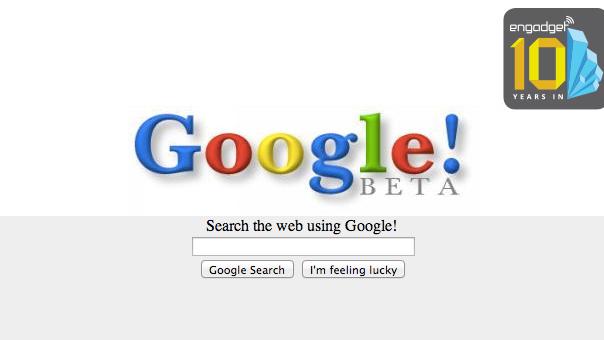Engadget10yearsin
Latest

From foe to friend: my journey with Linux
Nowadays, it's just a sanctuary for my father to play marathon sessions of Diablo 3. But a little over 15 years ago, the breakfast nook in my parents' kitchen more closely resembled a coliseum where man (my father) was pitted against machine. Back then, it wasn't uncommon to hear strings of profanities streaming out of the room while he sat in front of a desktop computer hunched over in defeat -- all in an attempt to run Linux. "What the... ?" (loud clacking of keys) BEEP "I don't get it..." (banging on keys) BEEP "God damn piece of shit!" (punching of keys, distinct metallic crash) "Grrr..."

Whatever happened to Netscape?
Netscape's story reads like a proper fairy tale: takeovers, fierce and hostile competition, split-ups, a giant payout and even a dragon! While Netscape may now only be a sweet, sweet memory to those who used it to first discover the web, the browser's monstrous impact has cemented it as one of the first and most important startups to shape the internet. Netscape's founders successfully plucked a brilliant idea from academia and pushed it onto the world's stage at a time when competition didn't exist, websites were not much more than plain-text blurbs and inline images were still revolutionary. Consider the battle that would ensue between this web pioneer and Microsoft. The "browser wars," as they came to be known, would ultimately lead to creation of Internet Explorer, Microsoft's antitrust suit and the formation of the Mozilla Project and Firefox.

Engadget Rewind 2008: BlackBerry Storm
Smartphone makers were still reeling from the arrival of Apple's touchscreen-only iPhone when 2008 rolled around. Research in Motion (RIM), a mobile manufacturer best known for its BlackBerry line and QWERTY keyboard prowess, was at the top of its game and primed to jump into this emerging form factor. That year, it launched the BlackBerry Storm smartphone -- a direct rival to Apple's handset. As RIM's premier effort in touchscreen smartphones, it offered an interesting spin on the interface with what it called SurePress. This was a touchscreen you could depress or click; an innovation RIM hoped would bridge the gap between the company's current physical keyboard-accustomed clientele and the next generation of smartphone buyers. The Storm was RIM's attempt to solve the "problems associated with typing on traditional touchscreens" and leverage its longtime experience with clickable keys. While the phone had a sleek and solid build, a vibrant 3.25-inch display and was backed by Verizon's network, that SurePress technology ended up doing more harm than good.

Google Search: A visual history
"To organize the world's information and make it universally accessible and useful." That was one of the primary goals Larry Page and Sergey Brin set when they launched Google in 1998 as a privately owned search company. Since then, the Mountain View-based outfit has branched out, creating a mobile operating system, mapping service, cloud-based productivity apps, branded devices and, now, smart thermostats. All of those offshoots, however, always point back to the company's original aim: search. That baseline service is something Google's been making refinements to ever since its inception. A practice that continues to this day, with the company constantly improving upon the usability and design of its search-based offerings. This means cleaning up a UI when needed, and launching new features that serve up that much-lauded universal accessibility in short order. What may come across as a small box centered in a vast expanse of white is, as you'll see, actually something that's constantly evolved since '98.

My First Time on the World Wide Web
The World Wide Web. It sounds like such a silly thing when you actually spell out those consecutive W's. Nowadays, we just say "the internet," but once upon a time the web was a new and exciting thing. It was a massive communications breakthrough that captivated minds both young and old with the promise of an "information superhighway," and forced us to endure achingly slow dial-up connections. Last month, the web turned 25 years old. Yes, Tim Berners-Lee's simple creation has gone on to spawn this digitally connected world we live in: the social networks, mega e-tailers and search engines we all know and depend on today. Things were simpler when the web started out, but we assure you, our early experiences were no less weird.

Which gadget changed your life?
When we ask readers like you to help us rank the top gadgets, we usually focus on the best (and sometimes the worst). Recently, you selected our Readers' Choice winners for the 2013 Engadget Awards, but in the spirit of our 10th birthday, we wanted to try something a little different. Do you have a gadget that's changed your life? Perhaps you made a leap from the LG enV VX9900 feature phone to the mystifying world of smartphones and scooped up an iPhone 3GS (like this author did in 2009). Or when you decided to move to the other side of the world and your Mom bought a Logitech QuickCam Pro 9000 to keep in touch and see your darling face over Skype.

Life in 140 characters or less: My first eight years on Twitter
"I am sick of cell phones." I posted that on Twitter on November 16th, 2006, during a time in my life when I made a living writing phone reviews. It was a one-off rant during a particularly busy week, and I didn't expect anyone to read it. Little did I know that Twitter would grow into the social media titan that it is today, and that particular missive would live on as my first-ever "tweet." I confess, I didn't particularly like the term "tweet," even if it was unofficially adopted by the community early on. Even Twitter itself didn't acknowledge the word until the company trademarked it in 2009.






